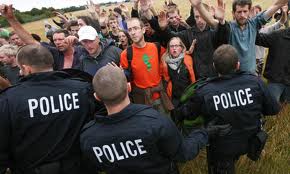Not all environmentalists are so willing to capitulate to corporate agendas. It is usually the more  conservative groups that will cooperate. In dealing with activists public relations firms generally employ a ‘divide and conquer’ strategy which exploits differences in the environment movement between moderates and radicals.
conservative groups that will cooperate. In dealing with activists public relations firms generally employ a ‘divide and conquer’ strategy which exploits differences in the environment movement between moderates and radicals.
Various public relations experts have attempted to categorise environmentalists in order to devise a strategy to deal with them. Lesly divides activists into five personality classifications:
He suggests that reasonable people can be dealt with using reason but zealots and fanatics have to be dealt with by withering away their power base and support.
Ronald Duchin, from the PR firm Mongoven, Biscoe and Duchin, categorises activists as either radicals, opportunists, idealists or realists:
[T]he activists we are concerned about here are the ones who want to change the way your industry does business--either for good or bad reasons: environmentalists, churches, Public Interest Research Groups, campus organizations, civic groups, teachers unions, and 'Naderites’.
Duchin describes radicals as those who want to change the system and have underlying socio-economic/political motives. They are anti-corporations and multinationals and are the hardest to deal with because they won’t compromise. Opportunists, according to Duchin, are activists who oppose corporations because they want power, attention, and employment. The key to dealing with them is to offer them the appearance of a victory.
Idealists are altruistic, highly credible, with a sense of justice. “They must be educated...Once the idealist is made fully aware of the long-term consequences or the wide ranging ramifications of his/her position in terms of other issues of justice and society, she/he can be made into a realist.” Realists are pragmatic and willing to compromise and work within the system. Duchin recommends concentrating any public relations activities on realists and seeking to cooperate with them. Generally a solution forged with the realists will become the accepted solution, he says.
 Duchin’s formula is therefore to isolate the radicals, turn the idealists into realists, co-opt the realists to support industry solutions and the opportunists will go along with the final agreement. The radicals, he says, need the support of the idealists and realists to have credibility. Without them they are marginalised and “seen to be shallow and self-serving.”
Duchin’s formula is therefore to isolate the radicals, turn the idealists into realists, co-opt the realists to support industry solutions and the opportunists will go along with the final agreement. The radicals, he says, need the support of the idealists and realists to have credibility. Without them they are marginalised and “seen to be shallow and self-serving.”
The isolation of radicals was also the strategy of Ketchum Communications Public Relations when it was advising its client Clorox Corporation in 1991 on how to deal with an expected anti-chlorine campaign. It recommended labelling protesters as ‘terrorists’ and suing critical journalists for defamation.
Labels such as ‘extremist’ and ‘terrorist’ are an example of the propaganda technique of name calling. It is, according to Penny Cass, an attempt to activate preconceptions and stereotypes already held by the public. “Category-based expectancies define a group in such a way as to predict future behaviour and to interpret ambiguous information in the shadow of pre-existing stereotypes”.
Cass argues that this is particularly effective in environmental disputes where people are willing to believe such things of people they disagree with and where environmentalists are often bearers of severe news. People who tell of extreme consequences are more easily labelled as extreme. Thus if a NASA scientist concludes that global warming is underway and another scientist questions this, the NASA scientist is seen to be the more extreme of the two, even if her assumptions are more conservative, because her conclusion “deviates from normative expectancies”.
This attempt to brand environmentalists as extremists and terrorists has been aided by various dirty tricks campaigns that have attempted to falsely pin violent actions on environmentalists. For example David Helvarg cites an example where Hill and Knowlton, on behalf of their clients Pacific Lumber, distributed fake photocopies of material purportedly produced by the group Earth First! calling for violence.
Isolating radicals also requires managing the media and ensuring the radicals don’t get much coverage. Lesly outlines various strategies for this including,